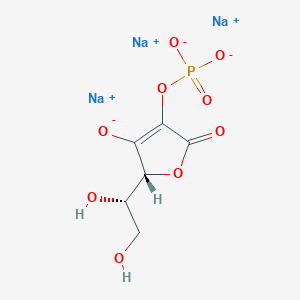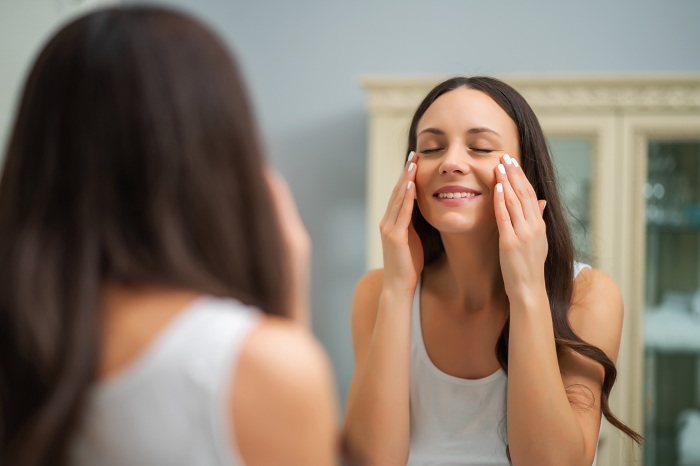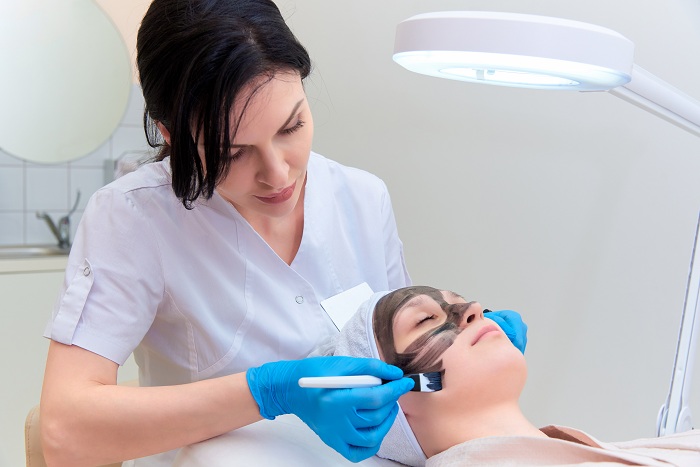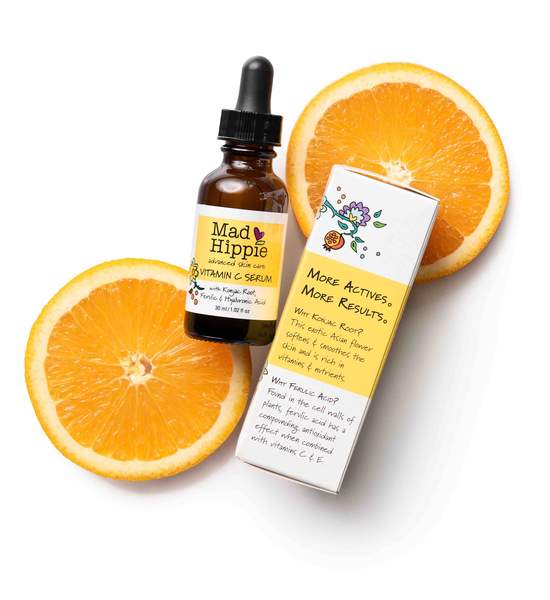It’s common knowledge that vitamin C is a skincare superstar. It’s used for everything from anti-aging to acne, and is the one ingredient that dermatologists recommend including in your skincare routine at every stage in your life, no matter your skin type.
Sounds straightforward enough, right? Wrong. Once you start to actually browse the many different vitamin C serums and creams out there, you’ll notice that the ingredient is available in multiple forms. L-ascorbic acid, ascorbyl palmitate, magnesium ascorbyl phosphate – which one do you choose?
The answer is…none of the above. Instead, sodium ascorbyl phosphate (SAP) is what you want to see. Don’t worry if you’ve never heard of it before, as it’s a relatively new form of vitamin C. However, it’s one that you definitely need to know more about.
Contents
What is Sodium Ascorbyl Phosphate?

Sodium ascorbyl phosphate is a vitamin C derivative. To get more specific, it’s the salt form of vitamin C, meaning that it’s lighter and not quite as intense as pure ascorbic acid. This isn’t a bad thing – it may not be quite as effective, but it’s also far less likely to cause irritation, making it safe for every skin type and concern. The more that your skin is able to tolerate an ingredient, the better it’ll work.
Another reason why SAP has become so popular is that it’s the most stable vitamin C derivative out there. L-ascorbic acid may be powerful, but it’s known for lacking stability. It oxidizes quickly when used in cosmetics. Not only does this mean that L-ascorbic acid isn’t very effective after a couple of months, but oxidized vitamin C could actually end up damaging your skin cells.
On the other hand, sodium ascorbyl phosphate remains stable even when exposed to light, oxygen, and water. This makes it much easier to incorporate the ingredient into a variety of different skincare formulas.
Benefits of Sodium Ascorbyl Phosphate for Skin
We’ve already discussed how sodium ascorbyl phosphate is gentle and stable, but what exactly does it do for the skin? Let’s take a look at some of its most revered benefits:
Boosts Collagen Production
Collagen is one of the main structural proteins in your skin. It holds the skin up from within, giving it its firmness, smoothness, and volume. While your skin readily builds new protein fibers in its early years, the collagen production process goes into decline as your skin ages. This is one of the biggest factors that contribute to the onset of fine lines and wrinkles.

Chances are, if you already follow an anti-aging skincare routine, then you’re already using products that contain collagen-building ingredients. Everything from vitamin A to peptides are loved for their efficacy at increasing protein production, as is, you guessed it, sodium ascorbyl phosphate [1]. While the effects of this won’t be instant, SAP will, over time, strengthen and support the proteins in your skin, giving your face a smoother, fuller, and younger appearance.
Antioxidant Properties
Free radicals are probably your skin’s biggest enemy. These unstable molecules make their way through your skin cells, causing serious damage to healthy cells as they do so. The only way to neutralize free radicals is through the use of antioxidants in your personal anti-aging regime.
There are hundreds of antioxidants out there, but vitamin C is known for being one of the most powerful. SAP shares these properties. In fact, research confirms that SAP is able to prevent and repair damage caused by free radicals and UV rays [2], making it a very noteworthy antioxidant.
A Science-Backed Acne Treatment
There aren’t many natural acne treatments out there, so it’s exciting to see that SAP holds great anti-acne promise. One clinical study found that products containing just 1% SAP are able to offer antimicrobial effects that last for up to eight hours [3]. Research also shows that products containing 5% SAP were able to successfully prevent and treat acne in 76.9% of subjects [4]. This is a surprisingly high number – it even exceeds benzoyl peroxide and many of the prescription acne treatments out there.

Here’s where it gets even better. There are now numerous studies available proving that the oxidization of lipids in the skin’s natural oil heavily contributes to acne breakouts [5]. Turns out, a clinical study has proven that SAP is able to reduce lipid oxidation by an impressive 40% [6].
All of this makes the ingredient an extremely effective acne treatment.
Lightens Dark Spots and Hyperpigmentation

Dark spots can leave the skin tone looking uneven and dull. It all comes down to sun exposure – the sun triggers your skin into producing melanin, which is the pigment that gives your skin its color. It not only gives you a tan, but it also works to protect your skin from UV damage. Unfortunately, over-exposure to UV rays causes excess pigment to be produced. All of those extra darkened cells cluster underneath certain areas of the skin, which leads to discoloration.
When it comes to seeking a skin-lightening treatment for UV-related dark spots, this isn’t always easy. Ideally, your beauty routine needs to be filled with plenty of skin-lightening ingredients, which is where SAP comes in. This form of vit-C is able to prevent your cells from producing too much pigment, while also dispersing any pigment clusters that may already be present. Its antioxidant properties help with this too. As a result, this leaves your skin tone looking brighter, lighter, and beautifully balanced.
How to Use Sodium Ascorbyl Phosphate
Sodium ascorbyl phosphate for skin is most effective when used in serum form. Not only do serums usually contain their active ingredients in high concentrations, but their lightweight consistency means that the skin quickly and easily absorbs them, putting those ingredients to use faster. That’s not to say that a moisturizer containing SAP won’t work, but it won’t be quite as powerful as a vitamin C serum.

One serum that everyone’s talking about at the moment is the Mad Hippie Vitamin C Serum. This brand has used SAP in an impressive 10% concentration in this serum, along with plant-based ferulic acid and vitamin E, both of which are also known for their antioxidant power.
10% SAP may seem like a lot. However, as we mentioned, SAP isn’t quite as effective as ascorbic acid. By including it in cosmetic products at a higher concentration, this can be countered, giving the skin all of the vit-C it needs for a true transformation. As an example, every review for the 10% serum mentioned above is positive. People love how it’s gentler than other forms of the vitamin, yet still effective enough to give them hope that there really is an end in sight to their wrinkles, dark spots, and acne.
Are There Any Side Effects?
Due to how gentle it is, sodium ascorbyl phosphate rarely has any side effects. The exception would be if you have ultra-sensitive skin. In this case, you may still experience some irritation, so introduce the ingredient into your cosmetic routine gradually.
FAQs

Which form of vitamin C is best for skin?
Sodium ascorbyl phosphate is the best form of vitamin C for the skin, especially when used in a vitamin C serum.
Is sodium ascorbyl phosphate pure vitamin C?
Ascorbic acid is the purest type of vitamin C, and sodium ascorbyl phosphate is the salt form of that.
Is sodium ascorbyl phosphate natural?
Yes, sodium ascorbyl phosphate is a naturally occurring compound.
Summary
Science has now proven numerous times that SAP is a cosmetic ingredient that comes with a wide range of benefits. It’s not often that we can say this, but this is an ingredient that literally everyone should be using. Even if you aren’t trying to treat the signs of aging, acne, or dark spots, its antioxidant properties will still support, strengthen, and nourish your cells, leaving you with a complexion so healthy that foundation and concealer makeup will soon become a thing of the past!
References
[1] https://www.researchgate.net/publication/323080669_Fortification_of_facial_skin_collagen_efficacy_by_combined_ascorbyl_palmitate_and_sodium_ascorbyl_phosphate
[2] https://pubmed.ncbi.nlm.nih.gov/10746160/
[3] http://www.ncbi.nlm.nih.gov/pubmed/18492184
[4] https://pubmed.ncbi.nlm.nih.gov/18492184/
[5] https://www.ncbi.nlm.nih.gov/pmc/articles/PMC3012032/
[6] http://www.ncbi.nlm.nih.gov/pubmed/18492184